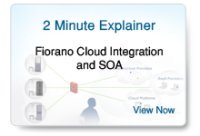Fiorano develops multi-platform integration infrastructure solutions addressing the needs of enterprises that need to rapidly compose and deploy easy-to-modify business processes. Fiorano ESB is platform-independent and can run on any of the existing Operating Systems including:
- Win32
- Solaris
- Linux
- AS/400
- OS-390
- Macintosh
Fiorano ESB® can run on any platform to offer increased applicability:
- Compatible with Weblogic, Websphere, Jboss and other application servers
- Re-usable Components can be developed in multiple languages including C, C++, Java, COM, .NET (C#), Visual Basic, Active X, and Scripting Languages
- Enhanced support for multiple Datastores and RDBMS's like MS-SQL Server, Oracle 7.x onwards, Btrieve, MS-Access, Sybase, DB2
- Supports Web Services standards like SOAP, WSDL, UDDI, XSLT, HTTP, etc and provides a powerful Web Services integration and management platform to create Web Services based on existing systems.
Interoperability
Fiorano is committed to leveraging existing and emerging industry technologies. Fiorano's solutions have the ability to seamlessly incorporate emerging standards for new technologies such as Web Services, J2EE, .NET, XML, etc to provide a readily extensible platform for EAI, BPM, Distributed Workflow and Enterprise Messaging.
J2EE
Defined by Sun Microsystems, J2EE is a set of standards that provide an excellent web application development and deployment platform. It defines the standard for developing multi-tier enterprise applications and simplifies enterprise applications by basing them on standardized, modular components, by providing a complete set of services to those components, and by handling many details of application behavior automatically, without complex programming.
J2EE includes standards for middleware (EJB and JMS), database connectivity (JDBC), transactions (JTA/JTS), presentation (servlets and Java Server Pages) and directory services (JNDI). J2EE enables robust and flexible solutions that may be deployed across a wide range of existing enterprise systems.
Fiorano ESB® provides a comprehensive approach for enterprise integration by using best-of-breed services and standards-based components. Fiorano incorporated Java standards to provide a foundation for distributed component-based system services. Fiorano's JMS product, FioranoMQ is a JMS 1.1 complaint Messaging Server, while Fiorano ESB works in conjunction with J2EE technologies and standards.
.NET
Microsoft's .NET is one of the emerging standards that is changing the way enterprises build Application software. .NET technologies enable greater agility and increased flexibility for integrating business processes within internal organizations or with external business partners.
Fiorano ESB provides for interoperability among .NET and other J2EE components which no other platform provides. Each .NET component can be converted easily into a Fiorano ESB® component, which can then communicate with any other component, written in any language and executing on any non-windows/windows platform. Fiorano ESB consists of C#RTL using which C# components can be seamlessly composed and used as a part of Fiorano ESB application which may consist of EJBs, legacy adapters and various other components. The key point to note here is that these .NET applications execute in their native form without the need for conversion into web services. This is a unique feature which leads to high performance and lower maintenance costs and makes it ahead of all other EAI/BPM platforms in terms of interoperability.
Web Services
Web services provide a standard that allow applications to communicate with one another and share information on the Web. A growing number of technology companies presently focus their efforts on the creation of Web services. As of now, most of the small, medium, and large businesses are looking toward the objectives of shorter-term return on investments while leveraging existing infrastructure. Today, there is a strong linkage between Web services technologies and the business integration challenges.
Web services present significant opportunities for organizations to quickly and cost-effectively adopt solutions and industry standards that keep pace with their rapidly changing business requirements.
Fiorano ESB® allows for seamless orchestration of web services. It consists of pre-built adapters that allow one to invoke web services by specifying the WSDL file associated with it. One can connect one or more of these adapters together to define a workflow which consists of a set of web services communicating with each other in a manner as specified by the Business Process.
XML
XML is one of the most important technologies for business integration as enterprises need to share data and business objects between incompatible systems. The greatest benefit of XML lies in its ability to manage islands of data using a common data format that is understandable to any processes/ systems/ businesses that use it for data representation, data exchange/ interchange and application integration.
Fiorano ESB provides a complete infrastructure solution for developing and deploying XML-based business processes to the enterprises. By using XML, Fiorano ESB provides the answer to integrate a wide range of data sources with different data formats for enterprise integration requirements.
Fiorano embraces the XML standard by using it for both data exchange as well as data storage. XML lies at the heart of Fiorano ESB® interoperability as it uses XML as a communication mechanism between the various Fiorano ESB® components. Also, Fiorano Adapters can extract and present data from any XML document found in enterprise applications. The use of XML in data exchange and storage makes Fiorano ESB® completely platform independent, due to which it can be installed on diverse platforms ranging from Windows, HP-UX, VAX and DEC machines.

 Japan
Japan Germany
Germany
